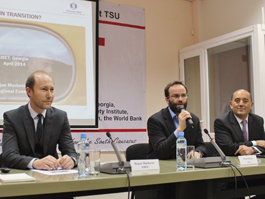On April 8, representatives of the European Bank for Reconstruction and Development (EBRD) presented their Transition Report at ISET. EBRD’s lead economist for Georgia, Bojan Markovic, spoke about the reform progress and economic developments in the year 2013 across the wider transition region, which includes Georgia.
The presentation, titled “Stuck in Transition” – which had an expressive photo of a young man sitting in an old Soviet bus as its opening slide – was introduced by Mr. Markovic. He began by discussing long term growth prospects.
On March 31, 2014, ISET hosted Dr. Joseph Tham of Duke University, who is currently collaborating with USAID Georgia. He provided a summary of the basic principles of project appraisal, and discussed the applications of Cost-Benefit Analysis in the USAID/India Fiscal Management Reform Project.
At the beginning of his presentation Dr. Tham spoke about the idea and role of Cost-Benefit Analysis (CBA) as a well-defined, objective, and systematic way to decide whether a project is good or bad. When conducting CBA an analyst estimates expected cash inflows and outflows during a project’s life, thus there is an intertemporal problem in which values of flows have to be “translated” in one reference point of time, usually in the present, and then analyst calculates the net present value (NPV). If NPV>0,then the project is good.
On March 12 ISET hosted a presentation by Jean Marc Stavroulakis, Country Finance Manager of Carrefour Georgia, and Petr Dlouhy, Merchandise Manager of the Fresh Division of Carrefour. The main points of the presentation were Carrefour’s market strategy to overcome existing socio-economic obstacles to the development effective value chains in the Georgian agricultural sector for 2014.
Carrefour, one of the largest French hypermarket chains and the second largest retailer in the world, started operating in Georgia in 2012. The major strategy of the company is to provide high quality products at lower prices that correspond to local demand. The best strategic suppliers in terms of quality, price and demand are considered to be the local producers of organic products.













